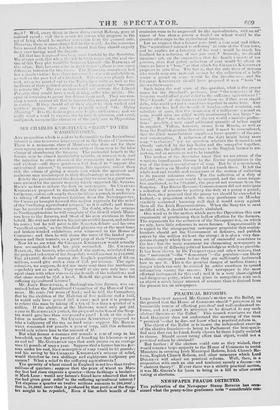PRACTICAL REFORMS.
LORD DALMENY opposed Mr. GROTE'S motion on the Ballot: on the ground that the House of Commons should " persevere in its honourable course of effecting practical and well-understood re- forms, and tint ;:ermit its attention to be diverted to any such abstract theories as the Ballot." This remark convinces us that Lord DALNIENY does not understand the meaning of the term " practical "—that he does not know what a practical reform is. The object of the Ballot is to insure the independent exercise of the elective franchise—to bring to Parliament the best-quali- fied tnen that can be found, freely chosen by those legally entitled to choose. Should secret voting effect that object, would not a practical reform be obtained?
But further : if the electors could vote as they wished, they would return a large majority to the House of Commons to assist Ministers in carrying Irish Municipal Reform, Irish Church Re- form, English Church Reform, and other measures which Lord DALMENY will admit are practical reforms. Well, then, is a proposition with such an aim and tendency merely a dream—an " abstract theory?" If ever there was a strictly practical 'notion, it was Mr. GROTE'S for leave to bring in a bill to allow secret voting at elections.


























 Previous page
Previous page